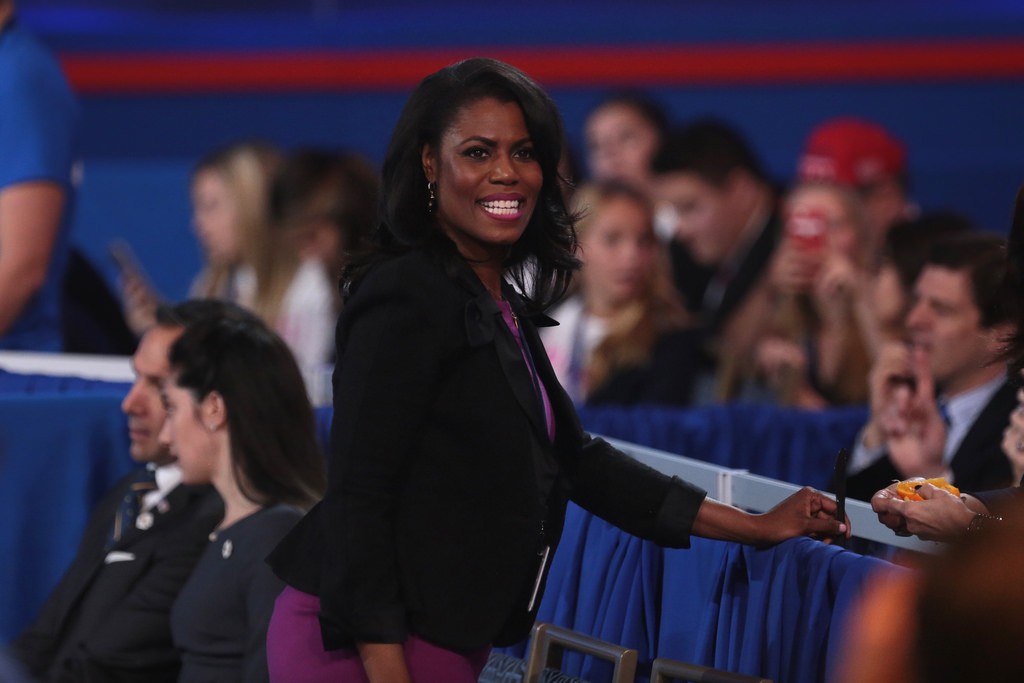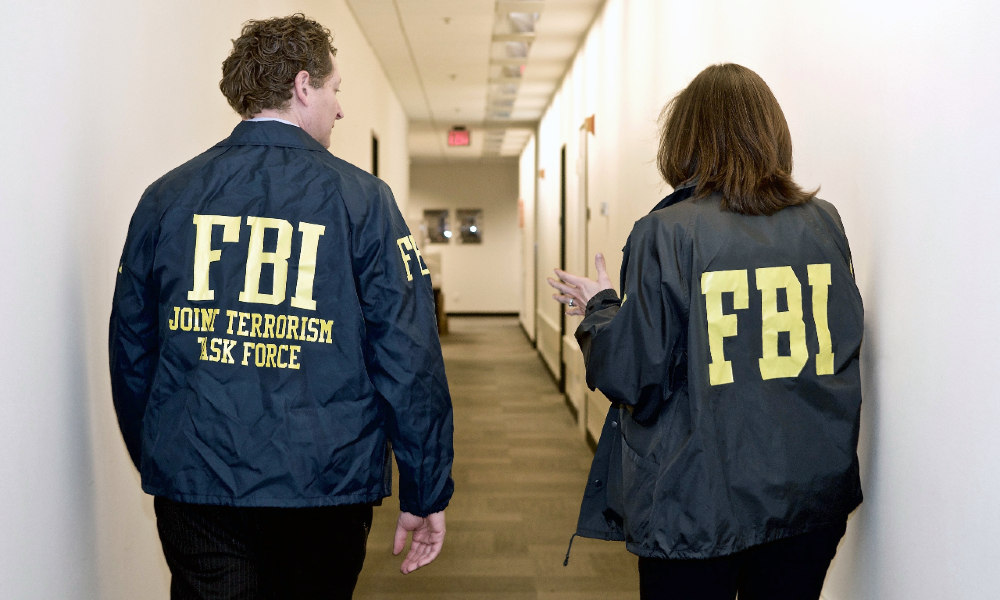Why the White House Can’t Stop Omarosa Manigault-Newman From Talking
The ongoing publicity tour by former senior White House staffer Omarosa Manigault-Newman, once designated as one of the “nastiest TV villains of all time,” is the culmination of the questionable hiring choices made during the early days of the Trump White House.

Published by The Lawfare Institute
in Cooperation With

The ongoing publicity tour by former senior White House staffer Omarosa Manigault-Newman, once designated as one of the “nastiest TV villains of all time,” is the culmination of the questionable hiring choices made during the early days of the Trump White House. Manigault-Newman has made a media splash by releasing multiple secret audio recordings of the president and his associates, some of which were made during her time at the White House—and one of which was reportedly conducted in the Situation Room, a serious breach of security protocol.
In promoting a new memoir chronicling her time working for the president, Manigault-Newman has revealed that shortly after she was fired from the White House, she was allegedly offered the equivalent of a “hush money agreement”: She would be immediately hired onto the president’s reelection campaign and paid $15,000 a month, and she would sign a non-disclosure/non-disparagement agreement that would encompass not only the campaign but also her time at the White House.
This is not the first time reports have surfaced about the administration’s use of agreements. In March, Ruth Marcus of the Washington Post wrote that the president pressured senior White House staffers to sign additional non-disclosure agreements (NDAs) when they joined the administration, similar to the infamous NDAs upon which he relied throughout his time in private business.
There is understandably a bit of confusion regarding the extent to which federal employees can be subject to NDAs once they leave government service. And the Trump White House does itself no favors by continuing to give vague and non-descript answers on the subject. But contrary to what the president might think, he lacks any authority to censor the unclassified communications of former federal employees.
Restrictions on the Speech of Former Federal Employees
The courts have long recognized that governmental bodies have a legitimate interest in regulating the speech of their employees in a manner that is distinct from how those same governmental bodies might try to regulate the speech of ordinary citizens. In 1968, however, the Supreme Court ruled in Pickering v. Board of Education that public employees do not relinquish their First Amendment rights simply by virtue of their employment and that the interest of public employees to comment on matters of public interest is not necessarily outweighed by the government’s interest in regulating that speech. Instead, the court held that a balancing test must be applied, weighing the employees’ constitutional rights and interests to contribute to the public debate against the government’s interests in limiting that contribution.
Relying on the foundational legacy of Pickering, the U.S. Court of Appeals for both the D.C. Circuit and the Fourth Circuit later addressed the related question of the federal government’s ability to censor the written publications of former federal employees who had held security clearances. In McGehee v. Casey, 718 F.2d 1137 (D.C. Cir. 1983), and United States v. Marchetti, 466 F.2d 1309 (4th Cir. 1972), the two appellate courts concluded that the federal government has no legitimate interest in censoring unclassified materials of former employees and that they may not censor such material, contractually or otherwise. The Marchetti court particularly refused to enforce a CIA “secrecy oath” that would have applied to the unclassified communications of former employees.
The rulings laid out in McGehee and Marchetti have survived to this day and have been incorporated into the regulatory framework of how the federal government handles efforts to restrict—if at all—the communications of former employees.
The Pre-Publication Review Process
The McGehee and Marchetti courts did not, however, declare open season on the government’s ability to impose prior restraint upon the communications of former employees—that is, prohibiting the publication of those communications in the first place. Both appellate courts reaffirmed that current and former federal employees lack a First Amendment right to publish or otherwise disseminate properly classified information and that the government retains the authority to censor those types of communications. The Supreme Court found the same in Snepp v. United States.
Any individual who has been favorably adjudicated for access to U.S. government classified information has, at one point or another, signed a document known as Standard Form 312, “Classified Information Nondisclosure Agreement.” This is the contractual agreement by which every security-clearance holder agrees to be bound. It memorializes a binding, legal understanding that the individual will not disseminate classified information without authorization. The Snepp ruling reaffirmed the government’s ability to contractually limit—through the SF-312 and related security NDAs—employees' ability to discuss classified information with unauthorized individuals, even after they leave federal employment.
What about former employees who want to publish, for example, memoirs about their time in government? To address this legal confusion and allow former employees to publish their work without fear of facing a criminal or civil suit for unauthorized disclosure of classified information, federal agencies constructed the pre-publication review process. This process—which is only legally mandatory for a subset of clearance holders but is generally available to all who held security clearances—provides former employees with an administrative mechanism through which they can secure U.S. government review and approval of their manuscripts in advance of publication. The scope of the government’s review, however, is limited only to properly classified information. The government cannot attempt to censor unclassified, albeit embarrassing, information within the manuscripts.
Once the government has completed its pre-publication review, it will inform the individual in writing whether the manuscript is approved for release in total; with redactions; or not at all. If the former employee believes the government’s classification determination is erroneous, whether in whole or in part, he or she can file a First Amendment civil lawsuit challenging that determination. Snepp and its progeny, however, require that the individual must first go through administrative pre-publication review; subsequently file the civil lawsuit; and ultimately receive a favorable judicial ruling before publishing any part of the manuscript originally deemed classified by the government. If the individual does not follow that process, the courts have been clear time and time again that they will side with the government if and when it ultimately takes legal action—whether civil or criminal—against the individual, no matter how flimsy the underlying classification determination may have been.
The Trump White House NDAs and the Saga of Omarosa Manigault-Newman
This brings us back to Manigault-Newman. If somehow she had failed to go through pre-publication review process before publishing her book, the president might be in luck. But Manigault-Newman appears not to have had a security clearance at all, making the pre-publication question potentially irrelevant.
The court precedent is explicitly clear that, with the exception of properly classified information, the president cannot and may not censor or impose any type of prior restraint upon his former aides—no matter how embarrassing the revelations those aides may seek to publicize. That includes the Trump administration’s apparent effort to construct a “hush money” agreement after individuals leave government employment, which would be unenforceable as a constitutional matter and would be contrary to public policy. Former federal employees simply cannot be forced to contractually surrender their First Amendment right to discuss unclassified details of what they saw while serving in government. (If they choose to voluntarily enter into such an agreement, of course, that is a separate matter.)
The Trump campaign has separately filed a civil lawsuit against Manigault-Newman, claiming that her comments on the president breached the campaign NDA she signed before working in the White House. But that is of no consequence either, at least with respect to her time in the administration. This NDA can no more contractually bind her to surrender her First Amendment rights than could the NDA she was offered after her departure from government.
This obviously is a frustrating legal stumbling block for the president, who has long made clear his preference for non-disclosure agreements to silence anyone who was once within his inner circle. However, as so many of us warned while he was running for president, overseeing your own private business and being the elected head of government are two very different legal worlds. Part and parcel of being the most powerful person on the planet and the leader of a constitutional republic is the corresponding limitation on your ability to silence detractors.




